外研英语二下《Module 3 Unit 2》教学课件
三年级上册英语教案-Module 3 Unit2 Point to the desk 外研版
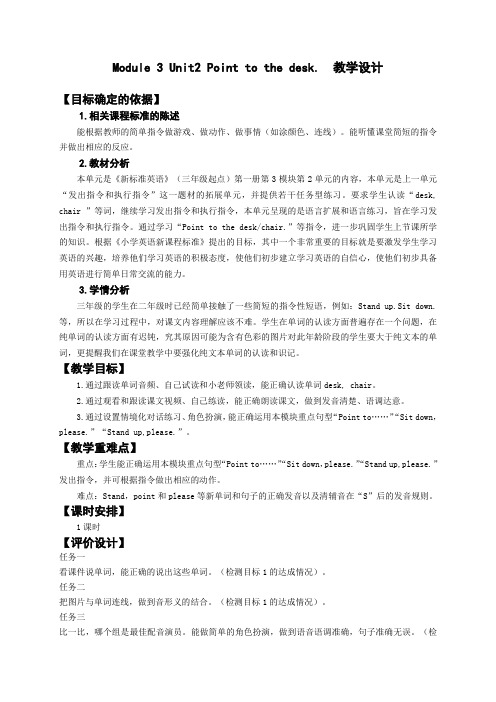
Module 3 Unit2 Point to the desk. 教学设计【目标确定的依据】1.相关课程标准的陈述能根据教师的简单指令做游戏、做动作、做事情(如涂颜色、连线)。
能听懂课堂简短的指令并做出相应的反应。
2.教材分析本单元是《新标准英语》(三年级起点)第一册第3模块第2单元的内容,本单元是上一单元“发出指令和执行指令”这一题材的拓展单元,并提供若干任务型练习。
要求学生认读“desk, chair ”等词,继续学习发出指令和执行指令,本单元呈现的是语言扩展和语言练习,旨在学习发出指令和执行指令。
通过学习“Point to the desk/chair.”等指令,进一步巩固学生上节课所学的知识。
根据《小学英语新课程标准》提出的目标,其中一个非常重要的目标就是要激发学生学习英语的兴趣,培养他们学习英语的积极态度,使他们初步建立学习英语的自信心,使他们初步具备用英语进行简单日常交流的能力。
3.学情分析三年级的学生在二年级时已经简单接触了一些简短的指令性短语,例如:Stand up.Sit down.等,所以在学习过程中,对课文内容理解应该不难。
学生在单词的认读方面普遍存在一个问题,在纯单词的认读方面有迟钝,究其原因可能为含有色彩的图片对此年龄阶段的学生要大于纯文本的单词,更提醒我们在课堂教学中要强化纯文本单词的认读和识记。
【教学目标】1.通过跟读单词音频、自己试读和小老师领读,能正确认读单词desk, chair。
2.通过观看和跟读课文视频、自己练读,能正确朗读课文,做到发音清楚、语调达意。
3.通过设置情境化对话练习、角色扮演,能正确运用本模块重点句型“Point to……”“Sit down,please.”“Stand up,please.”。
【教学重难点】重点:学生能正确运用本模块重点句型“Point to……”“Sit down,please.”“Stand up,please.”发出指令,并可根据指令做出相应的动作。
外研版(三起)六年级英语上册 Module 3 Unit 2 精品课件
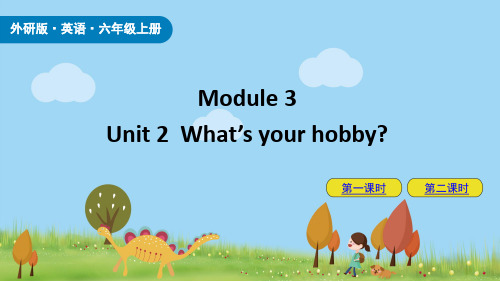
Practise.
-What’s his hobby? - _P_la_yi_ng_b_a_sk_e_tb_a_ll is his hobby.
-What’s her hobby? - _L_is_t_en_in_g_to_m_u_s_ic_ is her hobby.
Homework
1.朗读并背诵第三模块第二单元活动一的句型。 2.预习活动二的课文。 3.试着用今天学习的句型说一说自己的爱好。
A: What’s your hobby? A: What’s your hobby? A: What’s your hobby?
B: _T_a_k_in_g_p_i_ct_u_r_e_s_is_ B: C_o_ll_e_c_ti_n_g_s_t_am__ps__is B: _F_ly_in_g__k_it_e_s_is___
Listen and circle.
1. Sue has got some dolls from Japan.
TF
2. Jack hasn't got any picture books.
TF
3. Taotao has got a dragon kite.
TF
4. Xiaoxue hasn't got a photo of her bicycle. T F
Teacher: Have you got any photos of your bicycle?
Xiaoxue: Yes. These are some photos of my new bicቤተ መጻሕፍቲ ባይዱcle.
Read in roles according to the following information.
[外研版]九年级英语上册Module 3 Unit 2优质课件
![[外研版]九年级英语上册Module 3 Unit 2优质课件](https://img.taocdn.com/s3/m/65f0997f76a20029bc642d1b.png)
那时候 In 1938, Dr Bethune came to China and helped treat the wounded during the Anti-Japanese War. At that time, there were few doctors, so he had to work very hard on his own. His experience of treating people in Spain独wa自s 一us人eful in China.
work without treating it. In the end, he died of his
wound.
死于……
Dr Bethune’s work for the Chinese people made him a hero in China. There are many books and films about him, and he is still remembered in both China and Canada today.
so that与so···that
(1) so that 主要引导目的状语从句,“目的 是······”。 从句中的谓语动词常和can, may, should等连用
例:你最好大声说话,以便我们能听到。 You’d better speak aloud so that we can hear you.
on one’s own
意为“独自的;独立的;主动的”。
例:我能独立把工作完成。 I am able to finish the work on my own.
continue
(1) continue 作动词,“继续”。 常用短语:continue to do/doing sth. 继续从事某事 相当于go on doing sth
外研版八年级上册英语《Module 3 Unit 2》教学课件
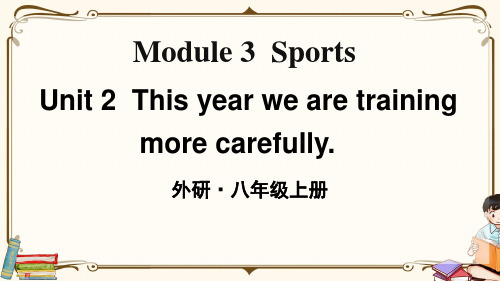
Learning to learn
You can use at that time / yesterday/ last week / last month/ last year … to talk what people did in the past; and use now / today / this week / this month / this year … to talk about what they do now.
Why
The days are short and the weather is cold.
We are playing better as a team now.
Check T or F.
1. Daming will have lessons this Saturday. F 2. We won the match last year. F 3. The practice starts at 10 p.m. F 4. It’s more difficult to practise in winter. T
5. The coach is pleased/is not pleased with them because…
6. So they now have a better/poor chance of…
Possible answers
1. It is Saturday and the school basketball team arrives to practise/train with the coach.
外研版四年级英语上册《Module 3 Unit 2》课堂教学课件PPT小学公开课

外研版 英语 四年级上册Module 3Unit 2 What’s the elephant doing?第一课时第二课时第一课时Watch and sing together.让我们一起去看马戏团动物们的表演吧!What’s this? bird-bird shorse-horse s tiger-tiger selephant-elephant smonkey-monkey sNew words.The elephant is draw ing pictures.大家猜一猜,马戏团的动物们都会表演什么?The tiger is jump ing.The bird is sing ing.The horse is danc ing.Practise.Read and act.-Whatare you doing ?-I’m…Look and answer.Listen, point and say.-What is she doing? -She’s…-What is he doing? -He’s…-What is it doing? -It’s…-What are theydoing ?-They’re…-What are they doing ?-They’re…Listen and read after it.They’re playing football.What are they doing?It’s drawing pictures.What is it doing?Role play and act out.Listen and say.What’s the elephant doing?-What’s it doing?-It’s drawing pictures.What are the tigers doing?-What are they doing?-They’rejumping.Practise.找不同的同学带着头饰上前扮演动物做动作。
外研版九年级英语上册Module 3 Unit 2 教学课件

我意识到了学习的重要性。
考向一 考向二 realise动词,意为“了解,意识到”,其 后可接that引导的宾语从句。 realise动词,意为“实现(梦想,愿望 等)”。
讲解来自《点拨》
eg:Mike finally realised his dream of being an actor. 迈克当演员的梦想终于实现了。
同学们,上一课学习的单词你们都掌握了吗?现 在大家来检验一下,点击下面的音频开始听写吧!
Dr Norman Bethune
1
Reading and vocabulary
Work in pairs. Look at the picture in Activity 2 and discuss who the person is and what he did. Use the words in the box to help you. Canadian doctor hospital sick
or taking care of himself. Once, he even worked for sixty-nine hours without stopping and managed
13
to save over a
hundred lives. One day in 1939, he cut his finger during an operation, but he continued 14 his work without treating it. In the end, he died of his wound.
15
Dr Bethune's work for the Chinese people made him a hero in China. There are many
下学期module2-unit3--外研英语

悠长的等待
一个女性艺术工作者的领悟
我今天才能明白。真的,要到今天,我才能知道,很多事情唯一的解决办法是只有等时间来证明,很多很多事情只有在回头看的时候才能够得到澄清。所以。在事情发生的当时,要生气或者要争辩 似乎都没有什么用处,家们唯一能做的事情应该就只是安静地等待,等待时光和岁月把所有的证据拿出来。
365开户 烟云散尽,尘埃落定,鼓山脚下的村庄一片静谧祥和,过往的沉重化为云淡风轻。我作为研究商帮化的学者,眼前却常常闪现出当年龙泉武家兄弟为了生计舍身忘死“五架小车下关东”的情景,
并常常为此泪目。“天下熙熙,皆为利来;天下攘攘,皆为利往。”自古人们孜孜矻矻苦挣苦熬,都是为了自己过上更好的日子,或者为了后人过上更好的日子。犹如我现在站立的十六楼,一层一层都 是由先人的血汗搭建而成,我才有机会登高望远,发思古之幽情。
遥望南山我在想,你见也不见,鼓山都在那里;你悠然还是凄然,鼓山也在那里。
遥望南山我在想,青山常在,人生苦短,现在是我在怀想千百年前的往事,再一个百年千年之后,后人会怎样回望我们这个时代?我们能够留下什么供后人怀想呢?
遥望南山我又在想,“欲穷千里目, 更上一层楼”。站在一楼二楼看不清的,登上十六楼便豁然开朗;二十岁三十岁看不清的,过了六十岁便幡然顿悟,“天上飘过五个字,啥都不是事”。
外研版五年级英语上册《Module3 Unit2》教学课件PPT小学公开课
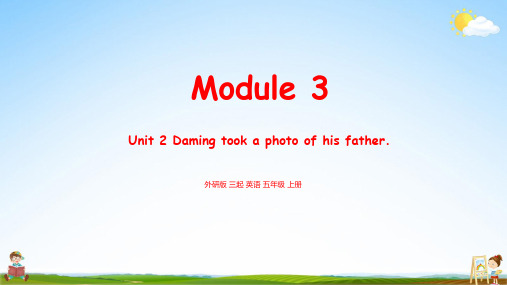
Module 3外研版 三起 英语 五年级 上册Unit 2 Daming took a photo of his father.Learning goals能听、说、认读单词:of, wall , arrive , for , mountain ,with ,plant✔ 能够运用句型:1.Daming took a photo of his father.2.They arrived there at ten o’clock in themorning.3.They walked on the wall for one hour.✔Who took this picture?Daming did.He’smy best friend.No, this isDaming.And I took it.Did Daming takethis one ,too? Look , listen and say.1.Who went to the Great Wall?2.How did they go there?3.When did they arrive?4.What did Damingdo?Daming and his father went to the Great Wall .They went to Badaling by bus.They arrived there at ten o’clock in the morning.Daming took a photo of his father.Listen and answers the questionsDaming and his father went to the Great Wall at theweekend. They went to Badaling by bus.They arrived there at ten o’clock in the morning. The wall is very old and very long. They walked on the wallfor one hour. 长城到达一个小时的时间长度Read拍……的照片There were lots of people. They took photos of themountains with beautiful flowers and green plants.Daming took a photo of his father.山植物有……mountains with … 有……的山脉D a m i n g a n d hi s f a t h e r Badalingwalktook photos the Great Wallarrive f o r a n h o u rold with longt h e r e w e r e l o t s o fLook and say____ a photo of .went to __________ at the weekend.They arrived there _____ o’clock in the morning.They went to Badaling_______.They ____ photos of the mountains.the Great Wall took took at ten by busRetell the storyDaming and his father ______(go) to the Great wall atthe weekend. They ______ (arrive) there at ten o’clock inthe morning. They ______(walk) on the wall for one hour.There ______ (be) lots of people. They _______(take)photos of the ________(mountain) with beautiful flowersand green plants. Daming took a photo of _______(he)father.一、用括号内单词的正确形式填空。
外研版八年级下 Module 3 unit 2 课件(PPT19张)
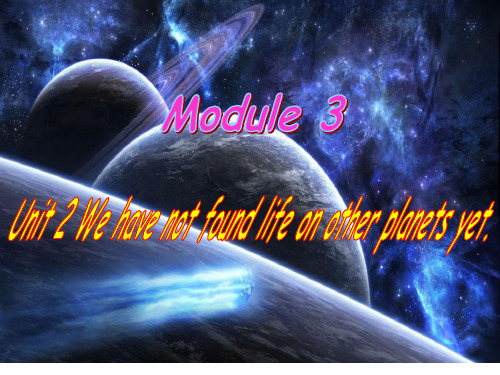
独自一人的
Is she alone there?
Anyway, we can send her a message (发送信息) to make her not feel lonely.
寂寞的
Chang’e has gone to the Moon.
Armstrong from the USA
Yuri Gagarin from Russia
1 What have you discovered there?
2 Why haven’t they sent us a message?
3 Why haven’t they visited us on Earth?
4 What have they done with(处理) our spacecraft?
环境
生长
People and things can grow on Earth.
there has been life here for hundreds of
数亿的 millions of years.
The solar system is a small part of (一小部分)our galaxy.星系
from the largest to the smallest :
A. galaxy
B. planet
C. solar system
D. star
B
E. universe
D
C A
E
Read the passage and choose the best title.
Anyone out there? Life on Earth Our solar system The stars at night
(三起点)外研版六年级英语上册《Module3_Unit2_名师课件》

No, …
Jack
Reading.
any picture books No, …
Taotao Flying kites. any dragon kites Yes, …
Xiaoxue
Riding bicycles.any photos of your bicycle
Yes, …
Role play.
bicycle bicycles
Riding bicycle is my hobby.
have重/ h点as 解got析一般疑问句
陈述句变一般疑问句: have提前,开头字母变大写,其他照 抄,其中I和we要变成you. 如:I have got a cat.
Have you got a cat? 肯定回答:Yes, I have. 否定回答:No, I haven’t.
Keep a nice hobby and enjoy your life every day.
保持良好的爱好, 享受每天的生活。
1. 词汇
doll 2. 句型
Summary bicycle
(1)--Have you got …? --Yes, …have. / No, …haven’t.
(2)--What’s your hobby? --Collecting stamps is my hobby.
三人一组进行游戏,按照图上的顺序进行问答,中途哪位同学 不能正确说出句子就淘汰。哪组顺利走完全程即获胜。
A: Have you got a / any…? B: Yes, I have. / No, I haven’t. Have you?
Let’s try.
Write about your hobby and talk about it.
外研版小学英语第三册Module 3 Unit 2 What are you doing-教案及教学反思

外研版小学英语第三册Module 3 Unit 2 What are you doing?教案及教学反思本课是外研版小学英语(供三年级起始用)第三册第三模块(Module)第二单元(Unit),本课以如何询问对方或他人正在发生的事情即What are you doing?/ What is he (she) doing? 为主线,展开如何现在进行时问句的学习。
本课是对上节课的拓展和延伸,而接下来的Module 4也将紧紧围绕现在进行时这一主线,所以本课起到了承上启下的作用。
学情分析本班共有学生29人,为村小学生,其中有少数学生对英语学习有强烈的好奇心和求知欲,大多数学生对英语学习还不够重视。
对此,培养所有学生对英语学习的兴趣是最关键最紧迫的任务。
因此本人在进行教学设计时,注重突出趣味性。
教学目标1.知识目标:词汇:listen to ;read句型:能理解、会说并能在实际情景中运用What are you doing? What’s he (she) doing? 句型2.能力目标:(1)能听懂老师发出的指令,迅速做出反应;(2)能综合运用所学知识进行口语交际。
3.情感目标:培养学生正确的语音,语调和语感,使学生能够进行交流,并能达到灵活运用,培养学生学习英语的兴趣。
教学重点和难点1、重点:如何询问对方和他人正在发生的动作2、难点:What are you doing? What’s he (she) doing? 句型的自由运用教学过程(教学过程的表述不必详细到将教师、学生的所有对话、活动逐字记录,但是应该把主要教学环节、教师活动、学生活动、设计意图很清楚地再现。
)一、Warming up :1、 Sing a song.设计意图:将Unit 1 的四个句子穿入歌曲中,为了复习第一单元学习过的表述他人正在做某事的句型。
2、I will show you some pictures, and let’s talk about them(PPT上呈现图片),提示学生,让他们用He (She) is ……表述。
外研版七年级上册英语课件:Module 3 Unit 2 (共38张PPT)

We can borrow books there.
library
Lead-in
Guess a place We can run and play football there.
playground
Lead-in
Guess a place
We can see the doctor there.
Can you see a red car in front of that house? 你能看到那所房子前面的一辆红色汽车吗?
Presentation
[拓展] in the front of 也表示位置关系,意为
“在……前部”,指在某个范围内的前面。 试比较: The teacher is in the front of the classroom.
classroom building
gate
Lead-in
playground sports hall
Lead-in
teachers’ office
school gate
classroom building
playground
Presentation
Label the pictures with the words and expressions on page 16.
现在太阳正躲在云层后面。 There is something behind his suggestion.
他的建议言外有意。 A cat came out from behind the door.
有一只猫从门背后出来。
Presentation
3.In front of the dining hall is the sports hall and the building in front ...
下学期module2-unit3--外研英语

圆,就给他起这个诨名。但后来大家都知道夏先生是真爱我们,这绰号就变成了爱称而沿用下去。凡学生有所请愿,大家都说:"同夏木瓜讲,这才成功。"他听到请愿,也许暗呜叱咤咤地骂你一顿;但 如果你的请愿合乎情理,他就当作自己的请愿,而替你设法了。
三年级英语下册Module3Unit2《Wewillhaveabreakfastat7》 优秀课件3(新版)外研版(一起)

•ห้องสมุดไป่ตู้
1、不积跬步,无以至千里;不积小流,无以成江海。——荀子 2、不要失去信心,只要坚持不懈,就终会有成果的。——钱学森 3、不作什么决定的意志不是现实的意志;无性格的人从来不做出决定。——黑格尔 4、成大事不在于力量的大小,而在于能坚持多久。——约翰逊 5、发现者,尤其是一个初出茅庐的年轻发现者,需要勇气才能无视他人的冷漠和怀疑,才能坚持自己发现的意志,并把研究继续下去。——贝弗里奇 6、凡是新的事情在起头总是这样一来的,起初热心的人很多,而不久就冷淡下去,撒手不做了,因为他已经明白,不经过一番苦工是做不成的,而只有想做的人,才忍得过这番痛苦。——陀思妥耶 夫斯基 7、富贵不能淫,贫贱不能移,威武不能屈。——孟子 8、钢是在烈火和急剧冷却里锻炼出来的,所以才能坚硬和什么也不怕。我们的一代也是这样的在斗争中和可怕的考验中锻炼出来的,学习了不在生活面前屈服。——奥斯特洛夫斯基 9、告诉你使我达到目标的奥秘吧,我唯一的力量就是我的坚持精神。——巴斯德 10、公共的利益,人类的福利,可以使可憎的工作变为可贵,只有开明人士才能知道克服困难所需要的热忱。——佚名 11、功崇惟志,业广惟勤。——佚名 12、故天将降大任于是人也,必先苦其心志,劳其筋骨,饿其体肤,空乏其身,行拂乱其所为,所以动心忍性,增益其所不能。——孟轲 13、贵有恒,何必三更起五更眠。最无益,只怕一日曝十日寒。——毛泽东 14、即使遇到了不幸的灾难,已经开始了的事情决不放弃。——佚名 15、即使在把眼睛盯着大地的时候,那超群的目光仍然保持着凝视太阳的能力。——雨果 16、既然我已经踏上这条道路,那么,任何东西都不应妨碍我沿着这条路走下去。——康德 17、涓滴之水终可以磨损大石,不是由于它力量强大,而是由于昼夜不舍的滴坠。——贝多芬 18、科学的永恒性就在于坚持不懈地寻求之中,科学就其容量而言,是不枯竭的,就其目标而言,是永远不可企及的。——卡· 冯· 伯尔 19、立志不坚,终不济事。——朱熹 20、立志用功如种树然,方其根芽,犹未有干;及其有干,尚未有枝;枝而后叶,叶而后花。——王守仁 21、没有伟大的意志力,就不可能有雄才大略。 ——巴尔扎克 22、耐心是一切聪明才智的基础。——柏拉图 23、能够岿然不动,坚持正见,度过难关的人是不多的。——雨果 24、你既然期望辉煌伟大的一生,那么就应该从今天起,以毫不动摇的决心和坚定不移的信念,凭自己的智慧和毅力,去创造你和人类的快乐。——佚名 25、你们应该培养对自己,对自己的力量的信心,百这种信心是靠克服障碍,培养意志和锻炼意志而获得的。——高尔基 26、逆水行舟用力撑,一篙松劲退千寻。——董必武 27、您得相信,有志者事竟成。古人告诫说:“天国是努力进入的”。只有当勉为其难地一步步向它走去的时候,才必须勉为其难地一步步走下去,才必须勉为其难地去达到它。——果戈理 28、切莫垂头丧气,即使失去了一切,你还握有未来。 ——奥斯卡· 王尔德 29、穷且益坚,不坠青云之志。——王勃 30、忍耐和坚持虽是痛苦的事情,但却能渐渐地为你带来好处。——奥维德 31、三军可夺帅也,匹夫不可夺志也。——佚名 32、生活的道路一旦选定,就要勇敢地走到底,决不回头。——左拉 33、生活就像海洋,只有意志坚强的人,才能到达彼岸。——马克思 34、生命里最重要的事情是要有个远大的目标,并借助才能与坚毅来完成它。——歌德 35、事业常成于坚忍,毁于急躁。我在沙漠中曾亲眼看见,匆忙的旅人落在从容的后边;疾驰的骏马落在后头,缓步的骆驼继续向前。——萨迪 36、书不记,熟读可记;义不精,细思可精;惟有志不立,直是无着力处。——朱熹 37、谁有历经千辛万苦的意志,谁就能达到任何目的。——米南德 38、思想的形成,首先是意志的形成。——莫洛亚 39、泰山不让土壤,故能成其大;河海不择细流,故能就其深。——李斯 40、疼痛的强度,同自然赋于人类的意志和刚度成正比。——武者小路实笃 41、天行健,君子以自强不息。——文天祥 42、为学须刚与恒,不刚则隋隳,不恒则退。——冯子咸 43、伟大的作品不是靠力量,而是靠坚持来完成的。——约翰逊 44、我的本质不是我的意志的结果,相反,我的意志是我的本质的结果,因为我先有存在,后有意志,存在可以没有意志,但是没有存在就没有意志。——费尔巴哈 45、我们应有恒心,尤其要有自信心!我们必须相信,我们的天赋是要用来做某种事情的。——居里夫人 46、我有两个忠实的助手,一个是我的耐心,另一个就是我的双手。——[法]蒙田 47、我之所以能在科学上成功,最重要的一点就是对科学的热爱,坚持长期探索。——(英国)达尔文 48、无论什么时候,不管遇到什么情况,我绝不允许自己有一点点灰心丧气。——爱迪生 49、无论是美女的歌声,还是鬣狗的狂吠,无论是鳄鱼的眼泪,还是恶狼的嚎叫,都不会使我动摇。——恰普曼 50、下苦功,三个字,一个叫下,一个叫苦,一个叫功,一定要振作精神,下苦功。——毛泽东 51、向着某一天终于要达到的那个终极目标迈步还不够,还要把每一步骤看成目标,使它作为步骤而起作用。——歌德 52、要从容地着手去做一件事,但一旦开始,就要坚持到底。——比阿斯 53、要在这个世界上获得成功,就必须坚持到底:至死都不能放手。——伏尔泰 54、一个崇高的目标,只要不渝地追求,就会居为壮举;在它纯洁的目光里,一切美德必将胜利。——华兹华斯
外研版英语九年级下册-Module 3 Unit 2 (课件)

Writing
Write a passage about the advantages and disadvantages of life today.
1. Choose two or three points from the notes in Activity 2 to write about. Families are smaller...
5
While-reading
Work in groups to deal with the key words, sentences and important language points.
1. light 【用法】n. 灯,光线
2. cold 【用法】不可数名词,意为“寒冷”,还有“伤风,感冒”的意思。
Sum up what you have learned today.
重点单词及短语 tiny, electric, light, candle, postman, cold, heat, full-time, role, education, transport等。 重点句子 1. She has lived in Beijing all her life. 2. There were five children in my family,and looking after us was more than a full-time
job. 3. She has a good education, and she goes to work even after getting married. 4. I’m happy to see she’s busy working every day, but sometimes I feel lonely because
